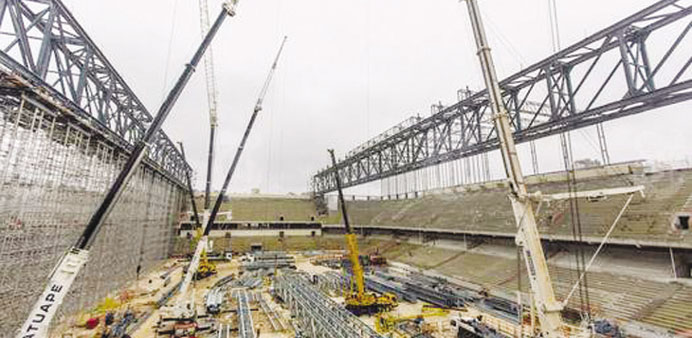The Arena Da Baixada stadium in Curitiba, Brazil, will hold the matches Spain-Australia, Ecuador-Honduras, Iran-Niger and Algeria-Russia of the FIFA Soccer World Cup 2014.
The countdown has begun to June 12 when the FIFA World Cup kicks off in Brazil, which is hosting the planet’s most popular sporting event for a second time, after the fourth edition in 1950.
Much has been said about the economic and social situation of the country, especially after last summer’s protests against government corruption and the hike in transport prices in major cities such as Sao Paulo.
And while a global event like the World Cup opens up new economic opportunities for hosting countries, the amount of money spent for the occasion also raises the question of whether it’s all worth it. Here are three arguments from two economists to help weigh the pros and cons.
Pro (Caio Megale)
1) WHAT GETS BUILT, STAYS. The World Cup comes at a timely moment for Brazil. Over the past two decades, the country’s economy has grown significantly thanks to thriving consumption, and is now more stable. But new challenges lie ahead. Weaknesses in infrastructure and productivity have been holding back the progress of the economy, putting the need to increase investments in the spotlight.
Organising such a big event offers opportunities to make massive new investments and therefore accelerate the development of different sectors. The 12 host cities will benefit from expanded airports, improved transport systems and better telecommunication services. Although these upgrades were necessary, they hardly would have taken place simultaneously if it wasn’t for the World Cup.
2) GOING GLOBAL. Long-term development could emerge in several key industries and markets. Along with the World Cup come opportunities to boost international trade, making the country’s companies more global. This is particularly important in Brazil, where under 1% of exports come from small and medium-sized businesses.
Foreign entrepreneurs have come to Brazil to do business during the preparation and will come during the event. If they play their cards right, sharp Brazilian entrepreneurs could take advantage of this and build strong and lasting international ties. This experience will bring new technologies, more knowledge and will expand the consumption market.
3) FUN, SUN AND ENGLISH. The organisation of this global event encourages companies to train their workers to better satisfy new customers by, for instance, teaching them new languages. The impact on the productivity of these workers could be substantial and lead to significantly higher wages, especially in a country where only a small proportion of the workforce speaks English.
These opportunities are obvious in sectors such as services (restaurants, event planning and executive transport), sports and tourism. If they are satisfied with their stay, foreign delegations will no doubt advertise in their own countries the services they used in Brazil, thus creating a strong demand.
Past editions of the FIFA World Cup indicate that the increase in the flow of tourists can last. In addition, the new stadiums and the spirit of the World Cup have a long-term effect on the population’s interest in playing sports.
Con (Marcelo Weishaupt Proni)
1) DO THE MATH. Whatever the promised benefits brought by the World Cup are (a boost to GDP, tax revenue, tourism, jobs and public transportation), they will for the most part be limited to the 12 host cities.
Moreover, there is evidence that the legacy of the World Cup won’t be quite what was initially expected. Predictions of its potential economic impact are based on suppositions that don’t reflect reality.
For instance, the estimates of the number of jobs created directly and indirectly by the event don’t consider the increase in productivity and the fact that as a result, companies might produce more and offer more services without creating a significant number of permanent jobs.
2) STADIUMS OR HOSPITALS? The total cost in infrastructure investment for the World Cup is estimated to be over 25bn reais ($10.5bn), of which only 15% are financed by the private sector. In this case, this expenditure risks causing reductions in public spending in other areas. It’s common knowledge, for example, that public money is more efficient when spent in the building of a new hospital rather than a new stadium.
These 25bn reais only represent 5% of the total of Brazil’s Growth Acceleration Program (known as PAC and launched by former President Lula before being continued under the current president, Dilma Rousseff). So all in all, the World Cup isn’t excessively expensive for an economy of that size. But in the case of some sites, the money borrowed by local authorities could be a burden that will compromise the realisation of other projects.
3) WHITE ELEPHANTS? The World Cup will without a doubt be very profitable for the world soccer federation FIFA, as well as a fine business deal for big companies involved in the construction — or in some cases, refurbishment — of the stadiums. But for the country and the population of some of the 12 host cities, these arenas could end up as expensive and unused installations, known as white elephants, a situation reminiscent of that faced by Portugal, with the country considering razing some of its stadiums just a few years after it hosted the 2004 UEFA championship.
Come August when the competition is over, the city of Manaus, situated in the heart of the Amazon forest, will be left with a stunning-looking stadium. But the four World Cup games that will take place there are likely to be the only soccer the venue will see, as the city doesn’t even have a top flight club.
The same can be expected of Natal, Cuiaba and even of the capital of Brasilia, causing soccer legend Romario to say “Maybe they’ll stage concerts at those stadiums a few times a month, but that aside, they’re a joke.” - - Worldcrunch/Folha de S Paulo

